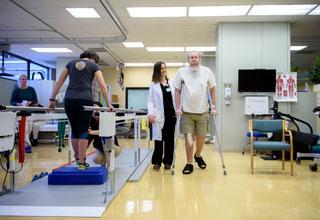When Should Seniors Stop Driving? How and When To Have the Talk
Learn the signs it’s time to stop driving and how to talk to a loved one if they should no longer be driving.

There comes a point in everyone’s life when it’s not safe to be behind the wheel anymore. But how do you know when to reconsider driving, and how should you approach a conversation with a loved one if you realize it’s too risky for them to remain behind the wheel? Here’s what you need to know.
Driving is riskier for older adults
For many older adults, the ability to drive is a significant factor in maintaining their independence and ability to get from place to place. But as people age, risk factors like health issues, reduced reaction times, and medications that affect cognition can make driving more dangerous. While medications can cause impaired driving at any age, older adults are more likely to be taking multiple prescribed medications that cause side effects that affect driving.
Age is a significant risk factor for getting hurt in a traffic crash. The National Highway Traffic Safety Administration estimates that 66% of people killed in traffic crashes in 2021 were 65 years or older.
As a staff occupational therapist and driver rehabilitation specialist at Hebrew Rehabilitation Center in Dedham, MA, this risk factor is top of mind for me when I work with patients. For example, I had one patient recently who was 97 and completely fine physically and mentally when it comes to her ability to drive, but she had severe osteoporosis. If she had been in an accident, her risk of it being severe or fatal was significantly higher.
Hebrew SeniorLife offers off-road clinical evaluations during which drivers are tested on their vision, cognition, functional mobility, and reflexes. The outpatient team at Hebrew Rehabilitation Center’s clinics in Boston and Dedham conducts the assessments and can help determine whether someone needs adjustments to their vehicle.
Recognizing the signs it may be time to stop driving
There are some warning signs to look out for that indicate it’s unsafe to drive. Sometimes, having difficulty moving from the brake to the gas pedal means you have weak hip flexors.
Here are some signs that it may be time to cut down on your driving:
- Getting lost while driving in familiar places
- Going to an incorrect destination at the wrong time or day
- Struggling to stay within your lane
- An inability to keep up with traffic (i.e., driving too slowly)
- Not obeying road signs (e.g., not stopping at a stop sign)
- Having difficulty moving from the brake to the gas pedal
- Finding unexplained scratches or dents on your car
Not all of these warning signs mean it’s time to turn in your keys for good. Sometimes, having difficulty moving from the brake to the gas pedal means you have weak hip flexors. I’ve seen people unable to read the road signs, and I have them come to the Hebrew SeniorLife clinic and discover that they need cataract removals, or a change in their prescription, or they take too many medications that affect their alertness. By addressing these underlying factors, you might be able to keep driving.
Should seniors stop driving after a dementia diagnosis?
Research indicates that as many as 60% of older adults with mild cognitive impairment and 30% of older adults with dementia continue to drive.
Should people with dementia or mild cognitive impairment stop driving right away? Not necessarily. The National Institute on Aging and Alzheimer’s Association both advise that driving is possible for some people in the earlier stages of Alzheimer’s and other forms of dementia. However, they also both encourage people to plan for when they won’t be able to drive, which will happen at some point as the disease progresses.
I have worked with people in the early stages of dementia or who have mild cognitive impairment to develop driving plans that work for them. Some have already adjusted their driving before they come to the clinic.
One patient had specific trouble with visual-spatial limits but also had great reaction time, physical abilities, and insight and was already self-regulating driving behaviors. Some of my suggestions were: don’t drive at night, pre-plan your destination, drive at low-traffic times, don’t drive when you’re drowsy or sleepy, and don’t drive with distractions in the car.
With those guidelines in place, the patient was comfortable continuing to drive for now. Her daughter went out and drove with her, and they felt like this was a safe strategy at this point with her new diagnosis.
How to talk to a loved one when they shouldn’t be driving anymore
While self-regulation is a good approach to gradually reducing driving, there will still come a point when it’s time to give up the keys for good. For some people, that’s not easy to come to terms with. In those cases, family members or other loved ones may face a challenging conversation about the fact that the person should no longer be driving.
You might be worried that your loved one won’t be receptive to the conversation, but research shows that’s not usually true. According to a survey of older adults conducted by The Hartford and MIT Agelab, over half of older adults who had been spoken to about their driving had followed the suggestions of others.
Who should lead the conversation? The same survey found that 57% of married drivers prefer to have their spouse initiate the conversation. Unmarried drivers want the conversation to happen with doctors, adult children, or close friends. Older adults overwhelmingly did not want to hear from police officers.
The best choice also depends on the specific personalities of the people involved. While many families default to choosing the most assertive and outspoken person as the family spokesperson, they’re often not the best choice to initiate early conversations about such a sensitive topic.
I recommend AARP’s free online seminar, We Need to Talk, which walks families through approaching this conversation.
Exploring alternatives to driving
You should also discuss what driving alternatives could work for your loved one. There are more options today than ever before when it comes to transportation. Traditional public transit and taxis may work, but rideshare apps like Uber and Lyft are also available.
You can start helping someone by setting up alternative transportation or exploring other transportation options like Uber. There are also other platforms and resources, like getting your medications delivered instead of picking them up, making those chores that require driving more accessible. Grocery delivery is becoming popular now too.
Another option is to coordinate as a family to determine whether anyone living nearby can help with transportation needs.
How Hebrew SeniorLife prioritizes older driver safety
Hebrew SeniorLife is dedicated to making driving safer for older adults. That’s why we have hosted the educational program CarFit, developed by AAA, AARP, the American Geriatric Association, and the Occupational Therapy Association, at Hebrew SeniorLife locations and in the Greater Boston community.
The goals of the CarFit program are to help older drivers improve the “fit” of their vehicles for safety and comfort, promote conversations among older adults and their families about driving safety, and link older adults with relevant local resources that help them drive safely for longer. The 20-30 minute assessment of older drivers’ vehicles consists of a 12-point checklist to ensure that older adults are safe in their cars and minimize undue risks.
We look at safety belt placement, seating height, the ability to see over the steering wheel, and how the steering wheel is positioned. Often, people aren’t aware they can adjust the steering wheel lower so the airbag will impact their chest, not their face, if it deploys.
Hebrew SeniorLife’s off-road clinical driver evaluations can help you determine whether it’s safe to keep driving. Get in touch with our outpatient rehabilitative therapy team today to schedule your driver evaluation.
Join Our Community: Subscribe to the Hebrew SeniorLife blog for weekly insights on healthy aging and senior living.
Blog Topics
Learn More
Outpatient Rehabilitative Therapies
At Hebrew Rehabilitation Center in Boston and Dedham, MA, we offer adult physical therapy, occupational therapy, and speech therapy using state-of-the-art mobility and treatment equipment.




